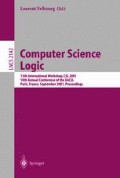Abstract
The most fundamental results of monadic second-order decidability, beyond the decidability of just pure monadic second-order logic, deal with the decidability of the monadic second-order theories of one and two successors and the decidability of the monadic second-order theory of linear order (Büchi, Rabin). Having moved from sets to multisets, we refine the underlying logic as linear logic. In contrast to the classical results, we prove the undecidability of just pure monadic linear logic, even if we use nothing but Horn formulas built up of unary predicates, in which no functional symbols are present. As for affine logic (linear logic plus weakening), we prove the undecidability of the Horn fragment of affine logic, which involves only one binary predicate (“linear order”) and a fixed finite number of unary predicates, and which contains no functional symbols at all. We also show the undecidability of the ∃-free Horn fragment of monadic affine logic in the presence of only one constant symbol (“zero”) and only one unary functional symbol (“successor”), and a fixed finite number of unary predicate symbols.
Along these lines, we obtain the undecidability of the optimistic protocol completion even for the class of communication protocols with two participants such that either of them is a finite automaton provided with one register capable of storing one atomic message, all the predicates used are at most unary, and no compound messages are in the use.
Access this chapter
Tax calculation will be finalised at checkout
Purchases are for personal use only
Preview
Unable to display preview. Download preview PDF.
References
J.R. Büchi. On a decision method in restricted second-order arithmetic. In: Logic, Methodology and Philosophy of Science, Proc. of the 1960 Congress, Stanford, CA, 1962, p. 1–11.
Burrows M., Abadi M., Needham R., A Logic of Authentication, ACM Transactions on Computer Systems, 8(1), (1990) 18–36.
Cervesato, I., Durgin, N.A., Lincoln, P.D., Mitchell, J.C., and Scedrov, A., A metanotation for protocol analysis, 12-th IEEE Computer Security Foundations Workshop, Mordano, Italy, June 28–30, 1999.
Cervesato, I., Durgin, N.A., Mitchell, J.C., Lincoln, P.D., and Scedrov, A., Relating strands and multiset rewriting for security protocol analysis, 13-th IEEE Computer Security Foundations Workshop, Cambridge, U.K., July 3–5, 2000, pp. 35–51.
Iliano Cervesato, Nancy Durgin, Max Kanovich. and Andre Scedrov. Interpreting Strands in Linear Logic. In: “2000 Workshop on Formal Methods and Computer Security”, 12th Int’l Conference on Computer Aided Verification (CAV 2000) Satellite Workshop, July, 2000, Chicago, USA.
Dolev D., Yao A., On the Security of Public Key Protocols, IEEE Transactions on Information Theory, 29(2), (1983) 198–208.
Durgin, N.A., Lincoln, P.D., Mitchell, J.C., and Scedrov, A., Undecidability of bounded security protocols, Workshop on Formal Methods and Security Protocols (FMSP’99), Trento, Italy, July 5, 1999. Electronic proceedings
Durgin, N.A. and Mitchell, J.C., Analysis of Security Protocols. In Calculational System Design, ed. M. Broy and R. Steinbruggen, IOS Press, 1999, pp. 369–395.
J.-Y. Girard. Linear logic. Theoretical Computer Science, 50:1, 1987, pp. 1–102.
V.Gehlot and C.A. Gunter. Normal process representatives. In Proc. 5-th Annual IEEE Symposium on Logic in Computer Science, Philadelphia, June 1990.
Yuri Gurevich. Monadic second-order theories. In “Model-Theoretical Logics” (ed. J. Barwise and S. Feferman) Springer-Verlag, 1985, pp. 479–506.
J.S. Hodas and D. Miller. Logic programming in a fragment of intuitionistic linear logic. Information and Computation, 110(2), 1994, pp. 327–365.
Max Kanovich. Horn Programming in Linear Logic is NP-complete. In Proc. 7-th Annual IEEE Symposium on Logic in Computer Science, Santa Cruz, June 1992, pp. 200–210
Max Kanovich. Linear logic as a logic of computations, Annals of Pure and Applied Logic, 67 (1994) pp. 183–212
Max Kanovich. The complexity of Horn fragments of linear logic. Annals of Pure and Applied Logic, 69:195–241, 1994.
Max Kanovich. The Direct Simulation of Minsky machines in Linear logic, In J.-Y. Girard, Y. Lafont, and L. Regnier, editors, Advances in Linear Logic, London Mathematical Society Lecture Notes, Vol. 222, pp. 123–145. Cambridge University Press, 1995.
A.P. Kopylov. Decidability of Linear Affine Logic, In Proc. 10-th Annual IEEE Symposium on Logic in Computer Science, San Diego, California, June 1995, pp. 496–504
Yves Lafont. The undecidability of second order linear logic without exponentials. Journal of Symbolic Logic, 61:541–548, 1996.
Yves Lafont and Andre Scedrov. The undecidability of second order multiplicative linear logic. Information and Computation, 125:46–51, 1996.
Yves Lafont. The finite model property for various fragments of linear logic, Journal of Symbolic Logic 62(4), p. 1202–1208.
P. Lincoln, J. Mitchell, A. Scedrov, and N. Shankar. Decision Problems for Propositional Linear Logic. Annals of Pure and Applied Logic, 56 (1992) pp. 239–311.
Meadows C., The NRL Protocol Analyzer: An overview, Journal of Logic Programming, Vol. 26, No. 2, (1996) 113–131.
D. Miller. A Multiple-Conclusion Meta-Logic. Theoretical Computer Science 165(1), 1996, pp. 201–232.
M. Minsky. Recursive unsolvability of Post’s problem of’ tag’ and other topics in the theory of Turing machines. Annals of Mathematics, 743:437–455, 1961.
Needham R., Schroeder M., Using Encryption for Authentication in large networks of computers, Communications of the ACM, 21(12), (1978) 993–999.
Michael Rabin. Decidability of second order theories and automata on infinite trees. Trans. Am. Math. Soc., 141, 1969, pp. 1–35.
Michael Rabin. Decidable theories. In Handbook of mathematical logic (ed. Barwise), 1977, pp. 595–629.
Michael Sipser. Introduction to the Theory of Computation, PWS Publishing, 1997.
Author information
Authors and Affiliations
Editor information
Editors and Affiliations
Rights and permissions
Copyright information
© 2001 Springer-Verlag Berlin Heidelberg
About this paper
Cite this paper
Kanovich, M. (2001). The Expressive Power of Horn Monadic Linear Logic. In: Fribourg, L. (eds) Computer Science Logic. CSL 2001. Lecture Notes in Computer Science, vol 2142. Springer, Berlin, Heidelberg. https://doi.org/10.1007/3-540-44802-0_4
Download citation
DOI: https://doi.org/10.1007/3-540-44802-0_4
Published:
Publisher Name: Springer, Berlin, Heidelberg
Print ISBN: 978-3-540-42554-0
Online ISBN: 978-3-540-44802-0
eBook Packages: Springer Book Archive

